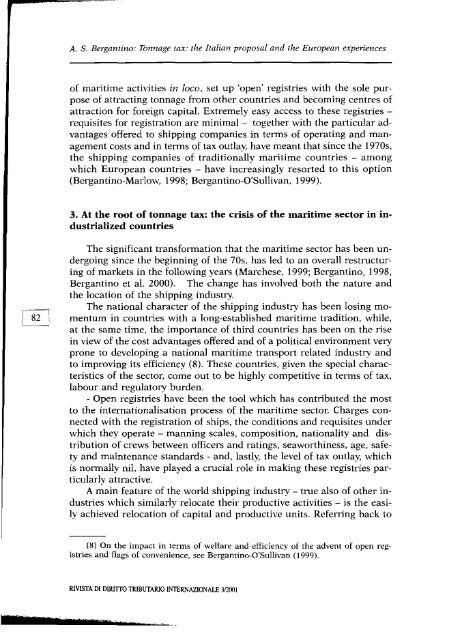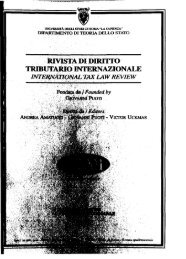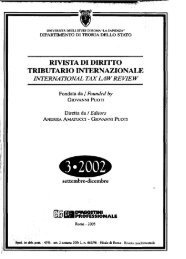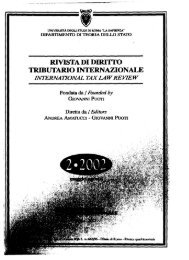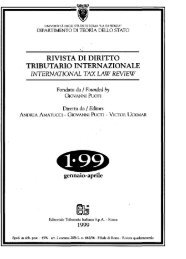RIVISTA DI DIRITTO TRIBUTARIO INTERNAZIONALE - Rdti.it
RIVISTA DI DIRITTO TRIBUTARIO INTERNAZIONALE - Rdti.it
RIVISTA DI DIRITTO TRIBUTARIO INTERNAZIONALE - Rdti.it
You also want an ePaper? Increase the reach of your titles
YUMPU automatically turns print PDFs into web optimized ePapers that Google loves.
A. S. Bergantino: Tonnage tax: the ltalian proposal and the European experiences<br />
of mar<strong>it</strong>i me activ<strong>it</strong>ies in loco, set up 'open' registri es w<strong>it</strong>h the sole purpose<br />
of attracting tonnage from other countries and becoming centres of<br />
attraction far foreign cap<strong>it</strong>aI. Extremely easy access to these registries -<br />
requis<strong>it</strong>es for registration are minimal - together w<strong>it</strong>h the particular advantages<br />
offered to shipping companies in terms of operating and management<br />
costs and in terms of tax outlay, have meant that since the 1970s,<br />
the shipping companies of trad<strong>it</strong>ionally mar<strong>it</strong>ime countries - among<br />
which European countries - have increasingly resorted to this option<br />
(Bergantino-Marlow, 1998; Bergantino-O'Sullivan, 1999).<br />
3. At the root of tonnage tax: the crisis of the mar<strong>it</strong>ime sector in Ìndustrialized<br />
countries<br />
The significant transformation that the mar<strong>it</strong>ime sector has been undergoing<br />
since the beginning of the 70s, has led to an overall restructuring<br />
of markets in the following years (Marchese, 1999; Bergantino, 1998,<br />
Bergantino et al. 2000). The change has involved both the nature and<br />
the location of the shipping industry.<br />
The national character of the shipping industry has been losing momentum<br />
in countries w<strong>it</strong>h a long-established mar<strong>it</strong>i me trad<strong>it</strong>ion, while,<br />
at the same time, the importance of third countries has been on the rise<br />
in view of the cost advantages offered and of a pol<strong>it</strong>ical environment very<br />
prone to developing a national mar<strong>it</strong>ime transport related industry and<br />
to improving <strong>it</strong>s efficiency (8). These countries, given the special characteristics<br />
of the sector, come out to be highly compet<strong>it</strong>ive in terms of tax,<br />
labour and regulatory burden.<br />
- Open registries have been the tool which has contributed the most<br />
to the intemationalisation process of the mar<strong>it</strong>ime sector. Charges connected<br />
w<strong>it</strong>h the registration of ships, the cond<strong>it</strong>ions and requis<strong>it</strong>es under<br />
which they operate - manning scales, compos<strong>it</strong>ion, national<strong>it</strong>y and distribution<br />
of crews between officers and ratings, seaworthiness, age, safety<br />
and maintenance standards - and, lastly, the leve! of tax outlay, which<br />
is normally nil, have played a crucial role in making these registries particularly<br />
attractive.<br />
A main feature of the world shipping industry - true also of other industries<br />
which similarly relocate their productive activ<strong>it</strong>ies - is the easi<br />
Iy achieved re!ocation of cap<strong>it</strong>ai and productive un<strong>it</strong>s. Referring back to<br />
(8) On the impact in tenns of welfare and efficiency of the advent of open registries<br />
and flags of convenience, see Bergantino-O'Sullivan (1999).<br />
<strong>RIVISTA</strong> Dl <strong>DI</strong>RfITO <strong>TRIBUTARIO</strong> <strong>INTERNAZIONALE</strong> 3nOOl


